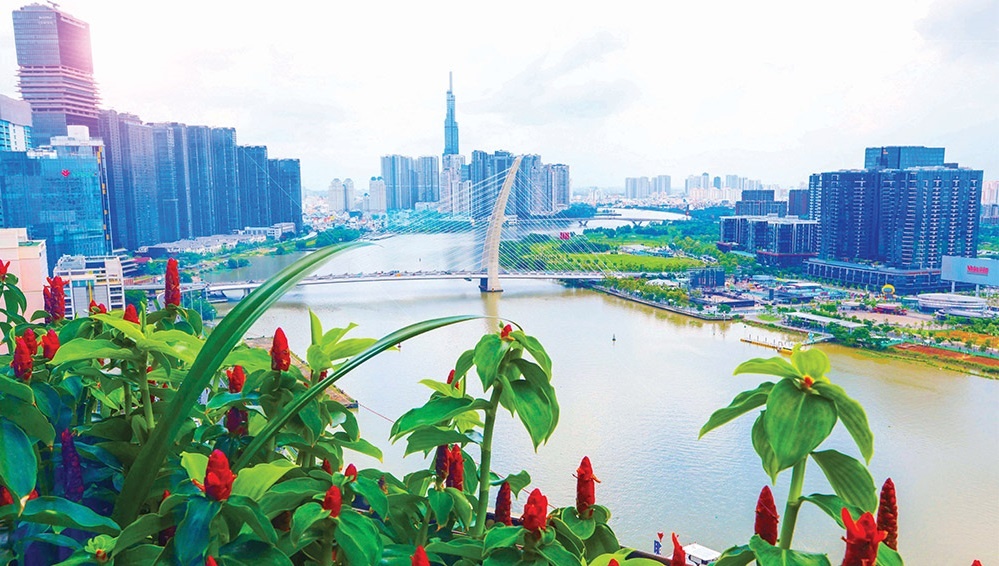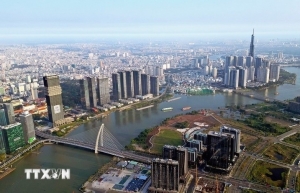INTERNATIONAL INVESTMENT
AND PORTAL
The resolution on developing an international financial centre (IFC) in Vietnam, which was passed by the National Assembly on June 27, will take effect from September 1.
Vietnam will develop an IFC in both Ho Chi Minh City and Danang to utilise the strengths of each city.
The financial centre in Ho Chi Minh City will develop capital markets, banks, currency markets, a fintech sandbox, and innovation in the financial sector, as well as establish specialised trading and new trading platforms.
In Danang, the financial centre will develop green finance, apply fintech, and digital services, a sandbox on digital assets, digital currencies, payments, and attract investment funds, remittance funds, and fund management companies.
The two cities have prepared human resources, facilities, infrastructure, and investment promotion with strategic and financial investors to build and operate the IFC.
“Vietnam has many young talents, and the IFC is the place for new ideas and business models to become reality. The country can also take advantage to become one of the world’s leading exporters,” said Jochen Biedermann, managing director of the World Alliance of IFCs.
An IFC with two locations is said to be suitable for Vietnam’s development needs. Ho Chi Minh City is the economic centre of the country, while Danang also has a strategic position, combined with a newly approved free trade zone model.
Ho Chi Minh City plans to utilise an area in District 1 and Thu Thiem New Urban Area covering 783 hectares, while Danang plans five land plots located next to major roads, and another land of 350ha to build a financial centre.
Ho Ky Minh, Permanent Vice Chairman of Danang People’s Committee, said, “The city has established a preparatory committee, including 27 members and an advisory council with 10 members, to accelerate the establishment of the IFC. In the third quarter of 2025, the city will send 10 officials and civil servants, including those with associate professor and doctoral degrees, to study training programmes at international organisations.”
To attract more investment resources to the financial centre, experts recommended that localities increase investment in infrastructure. “An IFC is not just a physical building, but an entire ecosystem. International experience shows that, to attract high-quality personnel, each centre needs to develop services and utilities in life such as entertainment, shopping, and medical examination,” said Nguyen Ba Hung, chief economist of the Asian Development Bank in Vietnam.
The resolution sets out many specific policies for the development of IFCs in Vietnam, including foreign exchange, banking, tax incentives, capital market development, fintech and innovation, and the development of markets and commodity exchanges.
In terms of commodity exchanges, some of Vietnam’s agricultural products have the highest turnover in the world, such as rice, coffee, and cashew nuts. Building commodity exchanges will help agricultural products gain an even greater position and control prices. However, it is also necessary to clearly define the authority to establish these exchanges.
Tran Hoang Ngan, a National Assembly deputy, said, “We should not launch many exchanges and then lose control of them. We should build standards and announce the conditions. We can form a single-member limited company, and later establish a joint stock company with the participation of state capital, similar to the formation of the Ho Chi Minh City and Hanoi stock exchanges.”
Products provided in the IFC would include the establishment of platforms, commodity trading platforms, commodity derivatives, carbon credits, cultural and artistic products, precious metals, and green finance.
In addition to physical goods, cryptoasset exchanges and digital assets will also be able to operate in the centre. This aims to manage virtual currency flows at home, while Vietnam currently ranks second in the world in terms of the rate of people owning digital assets.
The resolution also provides notable incentives. Specifically, foreigners working in the IFC will be exempt from personal income tax until 2030. Projects in priority areas will be assigned and leased land for a maximum of 70 years; in other areas, the land use term is no more than 50 years.
These projects are also subject to a preferential corporate income tax (CIT) rate of 10 per cent for 30 years, a maximum tax exemption for four years, and a 50 per cent reduction in payable tax for the next nine years. For projects not in priority sectors, the CIT rate is 15 per cent for 15 years, a maximum tax exemption for two years, and a 50 per cent reduction in payable tax for the next four years.
In addition, the dispute resolution mechanism in business investment is also a key issue when building an IFC. Parties will be allowed to use dispute resolution methods according to Vietnamese law, or at foreign and international arbitration.
Discussing at the National Assembly before voting, Minister of Finance Nguyen Van Thang said that the government saw the risks of establishing trading platforms, which would potentially pose some risks such as speculation, price inflation, and asset bubbles. Accordingly, the legal framework needs to be built synchronously, with strict and transparent monitoring institutions to manage transactions.
“The government will study regulations related to the mechanism for controlling capital inflow and outflow risks, preventing money laundering, or flexible liquidity management tools,” the minister said.
 Financial centre goals set in stone
Financial centre goals set in stone
Nguyen Thuy Hanh, CEO, Standard Chartered Vietnam
Vietnam’s potential for development will be enhanced if the country succeeds in building an IFC, particularly in the areas of capital management, international payments, and cash flow control.
Establishing an IFC in Vietnam would create significant opportunities for both domestic and international businesses and financial institutions. This is because such centres typically offer lower operating costs, clear and flexible legal frameworks, and a favourable business environment. At the same time, investors expect that setting up headquarters or trading offices in a financial hub in Vietnam would come with tax incentives, simplified legal compliance, and more efficient business operations.
Moreover, financial products and services would become more diverse. This would include digital banking transactions, digital currency, commodity index trading, greater freedom in foreign currency trading and exchange, centralised cash flow management mechanisms, which are not yet common in traditional banks, as well as commodity transactions with more sophisticated risk management tools.
Regarding regulatory compliance costs, if the IFC is governed by a unified regulatory body, the compliance processes and costs would be simpler and more consistent, helping businesses shorten transaction processing times.
Additionally, cash flows into and out of this financial centre could be more flexible compared to the traditional economic system.
Investors are increasingly concerned with the ability to apply environmental, social, and governance standards and regulations such as International Financial Reporting Standards. Currently, banks in Vietnam have not fully implemented these standards.
Richard D. McClellan, founder, RMAC Advisory
The approval of special mechanisms for Vietnam’s IFC marks a major step forward. It sends a clear signal to both domestic and international stakeholders that Vietnam is serious about elevating its role in global finance.
Over the past two years, I’ve been privileged to witness firsthand the vision and focus the government has brought to this initiative, as they’ve carefully laid the groundwork. The key now is moving from vision to delivery - establishing the legal, regulatory, and institutional frameworks that will give investors lasting confidence.
This includes enacting regulations that allow for financial product diversification and innovation, clarifying the tax regime for offshore investors, and ensuring clear rules on dispute resolution.
A modern governance structure for the IFC itself will be equally important, ideally with an empowered, professional operating unit that can manage licensing, promotion, and compliance matters at international standards. Just as important is alignment with global best practices in areas such as anti-money laundering, counter-terrorist financing, capital market development, and fintech regulation. These reforms must go hand in hand with efforts to exit the Financial Action Task Force grey list.
If Vietnam can deliver on these next steps, the IFC will emerge not only as a competitive regional hub for financial services, but also as a catalyst for wider reforms in the domestic system, helping to modernise financial markets, mobilise long-term capital, and deepen economic resilience for decades to come.
Tyler McElhaney, country head, Apex Group
Vietnam has strategic importance from its manufacturing prowess and supply-chain leadership to its growing influence in AI, semiconductors, and advanced tecg.
In our experience, the most successful IFCs all rest on a common set of policies designed to attract and retain global capital. They begin by offering preferential tax and land-lease terms, streamlining business registrations, and adopting investor-friendly immigration rules that ensure money, and the people who manage it, can move freely.
Equally critical is the coordinated allocation of budgets between central and local governments to build the underlying infrastructure, utilities, real estate developments and mixed-use complexes, that anchors a financial district. Incentives for foreign banks to open headquarters or branches cement the centre’s credibility and liquidity.
On the regulatory front, simplifying approvals for priority industries ensures a balanced ecosystem: traditional pillars like capital markets, banking and insurance thrive alongside emerging fields such as digital assets, fintech and green finance. A well-designed sandbox framework then accelerates the rollout of innovative financial products, while targeted measures, such as tax breaks or grants for carbon-credit trading and green project financing, embed sustainability into the centre’s growth trajectory.
Asset management and investment funds are instrumental in shaping a country’s economic trajectory. As Vietnam accelerates growth and deepens ties to global markets, adopting world-class asset-management practices will strengthen its financial sector’s efficiency and resilience, laying the groundwork for prosperity.
 Policies for Vietnam’s launch to the global financial map
Policies for Vietnam’s launch to the global financial map
In the global competition for capital, major financial centres such as Singapore, Dubai, and Shanghai have secured their edge through clear, decisive, and flexible policy frameworks.
 National Assembly's Resolution on International Financial Centre issued
National Assembly's Resolution on International Financial Centre issued
The resolution also aims to create an attractive environment for investment in the financial service sector to promote investment attraction and the free movement of international capital between the International Financial Centre and the world develop the stock and insurance markets, banking activities, fintech, digital assets, commodities, and e-commerce in Vietnam and integrate with international markets.



















